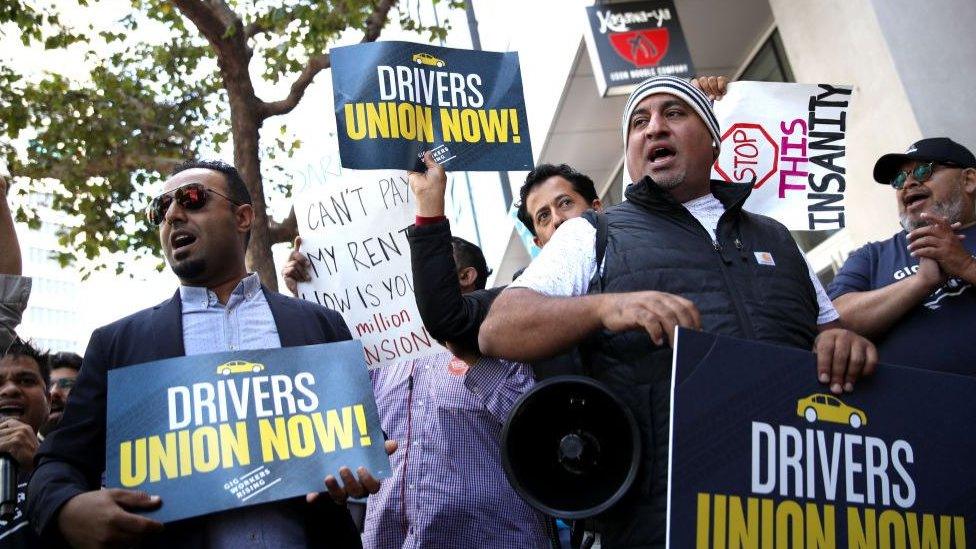Uber says 'gig economy' law will not hurt business
- Published

Gig economy workers are demanding more representation
Uber has insisted a new Californian law will not force it to change how it treats its drivers.
Lawmakers passed Assembly Bill 5 (AB5) on Tuesday, a move designed to pave the way for so-called “gig workers” to become employees and gain additional rights.
But Uber told reporters, external it “strongly believed” it met the new law’s requirements for legally classifying workers as “contractors” instead.
Nevertheless, the firm said it had, along with rival ride-sharing service Lyft, invested $60m (£49m) in campaigning for alternative measures to be introduced.
Uber said in a conference call on Wednesday it was prepared to spend more, and had hired the “best campaign team available”.
AB5 passed California's Senate 92 votes to 11 late on Tuesday night, and is expected to be signed into law by state governor Gavin Newsom imminently.
The bill could have big implications not just for rideshare firms, but other app-based services offering “gigs” to workers, such as DoorDash and Postmates.
Shirked responsibility
In an opinion piece for the Sacramento Bee newspaper earlier this month, external, Governor Newsom endorsed the bill, saying companies such as Uber - today valued at $56bn - were abusing employment law and making working people worse off.
“Workers lose basic protections like the minimum wage, paid sick days and health insurance benefits,” he wrote. “Employers shirk responsibility to safety net programs like workers’ compensation and unemployment insurance. Taxpayers are left to foot the bill.”
AB5 demands that workers be considered employees unless companies can prove the worker is “free from the control and direction of the hiring entity in connection with the performance of the work”.
Critics of gig economy firms say app-based work - which assigns jobs and attaches a rate of pay - mean workers are not “free from control”. The companies, however, argue that because workers can determine when they work, where they work and for how long, they are “free”.
AB5 will force Uber and other firms like it to go through what’s known as the ABC test, which assesses the question of whether or not companies can consider their workers contractors rather than employees.
“Just because the test is hard doesn’t mean that we will not be able to pass it,” said Tony West, Uber’s top lawyer, on Wednesday.
Limiting flexibilty
The firm’s confidence will likely be tested when AB5 comes into force on 1 January 2020. Under the law, cities in California can sue Uber (or other gig-economy firms) directly if they feel the firm is not complying - previously it was up to individual drivers.
Analysts have predicted devastating consequences for gig economy firms’ bottom line if they are forced to reclassify workers into employees. When asked, Uber would not offer any guidance to investors over how damaging such a change would be. The firm lost just over $5.2bn in its last reported quarter. Lyft, valued at $15bn, lost $2.3bn in the same period.
The companies warned they would look to implement more traditional work patterns.
“Flexibility of drivers would be limited,” Uber’s Mr West said.
“Drivers would not be able to choose to sign on when they wanted. Not only would they have to work shifts, they would be deployed to areas, rather than choosing where to pick up a fare.”
He added: “Based on what drivers tell us, they are not changes they would welcome.”
Uber drivers in Nairobi explain why they are going on strike
Instead, Uber - along with Lyft - has proposed drafting alternative legislation as a compromise. It would guarantee a minimum wage of $21 per hour, and offer the chance for sectoral collective bargaining, allowing workers across the rideshare industry to band together in negotiations.
The compromise, yet to be drafted, does not look likely to sway California’s lawmakers.
“Billionaires who say they can’t pay minimum wages to their workers say they will spend tens of millions to avoid labour laws,” Ms Gonzalez wrote on Twitter last week.
“Just pay your damn workers!” she added.
_____
Follow Dave Lee on Twitter @DaveLeeBBC, external
Do you have more information about this or any other technology story? You can reach Dave directly and securely through encrypted messaging app Signal on: +1 (628) 400-7370
